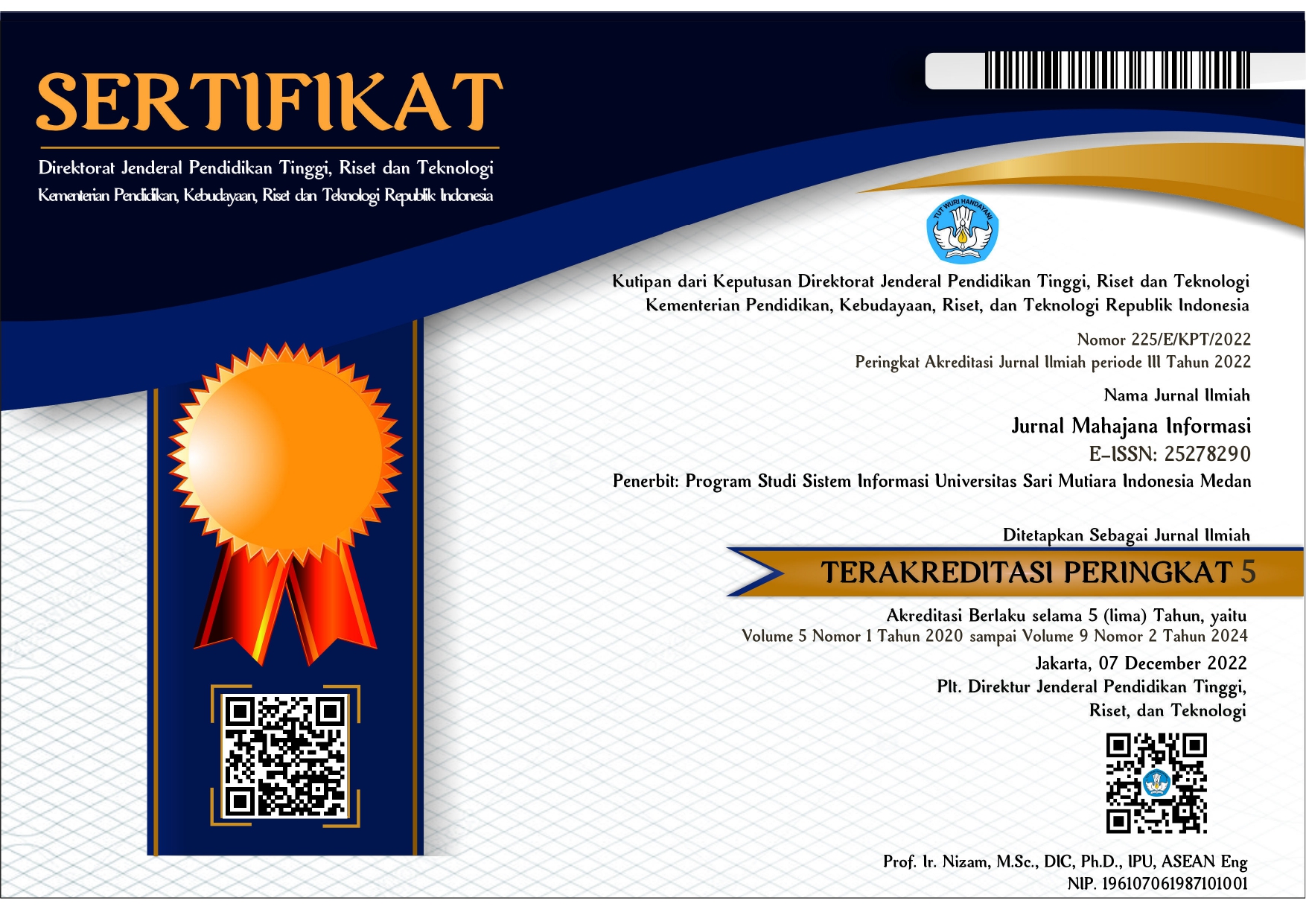Penerapan Algoritma Apostolico-Giancarlo dalam Sistem Sharing Knowledge Sebagai Upaya Meningkatkan Kompetensi Pegawai
DOI:
https://doi.org/10.51544/jurnalmi.v9i2.5681Keywords:
knowledge management system, apostolico-giancarlo algorithm, performance, tacit knowledge, explicit knowledgeAbstract
Knowledge Management is an effort made to manage knowledge through three important components, namely, people, processes and technology. The knowledge contained in each individual that is still stored in the head (tacit knowledge) needs to be documented in a media or system (explicit knowledge) so that intellectual assets in the organization are maintained. In line with the mission of the Ministry of Finance, namely adaptive management of Human Resources according to technological advances, the linkage and compatibility between education, learning and application of values and performance targets supported by knowledge management has been realized. The Information and Communication Technology and State Property Management Office is a Technical Implementation Unit which is under and directly responsible to the Head of the Center for Information Systems and Financial Technology, Secretariat General, Ministry of Finance. Knowledge management must be managed well to increase employee competency by using the Apostolico-Giancarlo algorithm search method through the Knowledge Management System.
Downloads
References
Abubakar A. M., E. H. (2019). Knowledge Management, Decision-Making Style and Organizational Performance. Andragogi: Jurnal Diklat Teknis Pendidikan dan Keagamaan (2023),10.36052/andragogi.v11i1.304.
Ariyanti P., D. T. (2023). Pengaruh Knowledge Sharing Factor Terhadap Keberlanjutan Penggunaan E-Learning Pasca COVID-19. Indonesian Journal of Computer Science, 10.33022/ijcs.v12i5.3382.
E., A. D. (2020). Knowledge management and entrepreneurship. International Entrepreneurship and Management Journal.
Elna Sari C, T. K. (2023). Pengaruh Knowledge Management Factor Terhadap Keberlanjutan Penggunaan E-Learning. Indonesian Journal of Computer Science (2023), 10.33022/ijcs.v12i5.3406.
G, F. M. (2019). Managing knowledge in organizations: A nonaka’s SECI model operationalization. Frontiers in Psychology (2019),10.3389/fpsyg.2019.02730.
H., R. R. (2023). Transfer Pengetahuan di Perpus. Model Awal Untuk Optimalisasi Kualitas Learning Management System Dalam Upaya Mendukung Transfer of Knowledge pada Penyelenggaraan Hybrid Learning Program Organisasi Penggerak.
Hidayat D.s., S. D. (2022). Knowledge Management Model for Smart Campus in Indonesia. Data (2022).
Keuangan, K. (2018). KMK-924/KMK.011/2018 tentang Kementerian Keuangan Corporate University, Dokumen Negara JDIH.
M., S. M. (2021). Jurnal Teknologi Informasi dan Komputer. Jurnal Teknologi Informasi dan Komputer.
Mardia, M. M. (2022). Knowledge Management Sebagai Upaya Pengembangan Learning Organization Di Lembaga Pendidikan Islam. Educational Leadership: Jurnal Manajemen Pendidikan .
Mardiani, E. S. (2023). SECI Model Design with a Combination of Data Mining and Data Science in Transfer of Knowledge of College Graduates' Competencies. International Journal of Advanced Computer Science and Applications, 14(7). https://doi.org/10.14569/IJACSA.2023.0140736.
N., G. (2019). Konsep Data, Information, Knowledge dan Wisdom (DIKW) Hierarchy pada Manajemen Kearsipan. JIPI (Jurnal Ilmu Perpustakaan dan Informasi) .
Pakpahan, A. d. (2021). Metodologi Penelitian Ilmiah. Medan: Yayasan Kita Menulis.
Praptowo, B. M. (2020). Keterlibatan Siklus Terintegrasi Knowledge Management Terhadap Perilaku Kerja Inovatif Sumber Daya Manusia di Balai Diklat Keuangan Yogyakarta. Jurnal Borneo Administrator, Vol. 16(1) : 1-22. DOI 10.24258/jba.v16i1.588.
Prehanto, D. R. (2020). KONSEP SISTEM INFORMASI (1st ed.;I. K. D. Nuryana, ed.). Surabaya: Scopindo Media Pustaka.
S, S. (2020). Menakar Penerapan Knowledge Managemenet di Indonesia: Sebuah Studi Literatur. Systemic: Information System and Inforatics Journal.
S., N. D. (2021). Penerapan Algoritma Apostolico Dalam Pencarian Tiket Pemesanan dan Pendaftaran Seminar. JURNAL MEDIA INFORMATIKA BUDIDARMA (2021),10.30865/mib.v5i1.2642.
Utami, T. (2023). Kajian Pengembangan Knowledge Management System (KMS) di Kementerian Perdagangan. Cendekia Niaga, 7(1), 31-45. https://doi.org/10.52391/jcn.v7il.831.
W., R. A. (2023). Knowledge management system’s implementation in private universities through SECI model. Indonesian Journal of Multidisciplinary Science .
Y.L.R., R. (2019). Pengaruh Implementasi Knowledge Management System . Jurnal Ultra Manajemen 10(1), 107-114.
Downloads
Published
How to Cite
Issue
Section
License
Copyright (c) 2025 Fanny Tania Ghia Puspita, Nur Wulan, Yessi Fitri Annisah Lubis

This work is licensed under a Creative Commons Attribution-ShareAlike 4.0 International License.













 This work is licensed under a
This work is licensed under a 